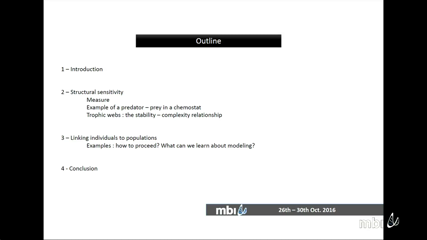MBI Videos
Jean-Christophe Poggiale
-
 Jean-Christophe PoggialeIn a first part, some problems observed with ecosystem models are discussed, focusing on the choice of the formulations of the biological processes involved, with several examples from the literature. Providing explicit relations between individuals properties and population or community dynamics allows to build model formulations on a mechanistic basis. We discuss some examples where this approach can be useful for understanding the community dynamics. The functional response in predator - prey systems is an example of ecological process involving several levels of organization and time scales. Its mathematical formulation should depend on the applications of the model : which spatial scales are considered? Is the environment homogeneous or heterogeneous? These questions should shape the choice of the formulations used in models. Moreover, the data used to develop a model are often acquired in conditions which are different than those of the applications. For instance, some formulations are based on data obtained in laboratory experiments, while the models are used to describe natural environments. Scaling up methods, which provide explicit links between different organization levels or between several temporal/spatial scales, are then useful to build formulations adapted for models used in the natural environment. Several applications to marine systems modelling are then presented.
Jean-Christophe PoggialeIn a first part, some problems observed with ecosystem models are discussed, focusing on the choice of the formulations of the biological processes involved, with several examples from the literature. Providing explicit relations between individuals properties and population or community dynamics allows to build model formulations on a mechanistic basis. We discuss some examples where this approach can be useful for understanding the community dynamics. The functional response in predator - prey systems is an example of ecological process involving several levels of organization and time scales. Its mathematical formulation should depend on the applications of the model : which spatial scales are considered? Is the environment homogeneous or heterogeneous? These questions should shape the choice of the formulations used in models. Moreover, the data used to develop a model are often acquired in conditions which are different than those of the applications. For instance, some formulations are based on data obtained in laboratory experiments, while the models are used to describe natural environments. Scaling up methods, which provide explicit links between different organization levels or between several temporal/spatial scales, are then useful to build formulations adapted for models used in the natural environment. Several applications to marine systems modelling are then presented.
